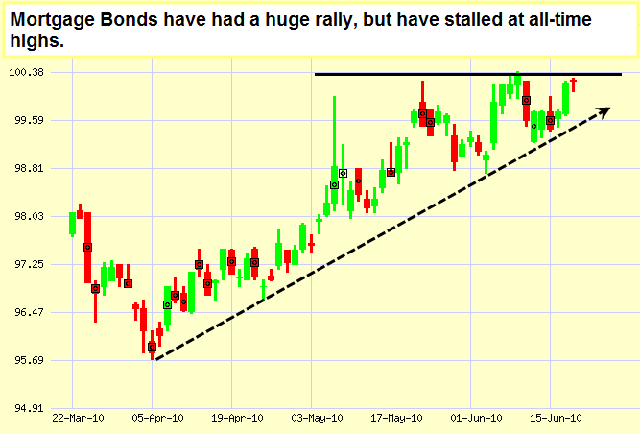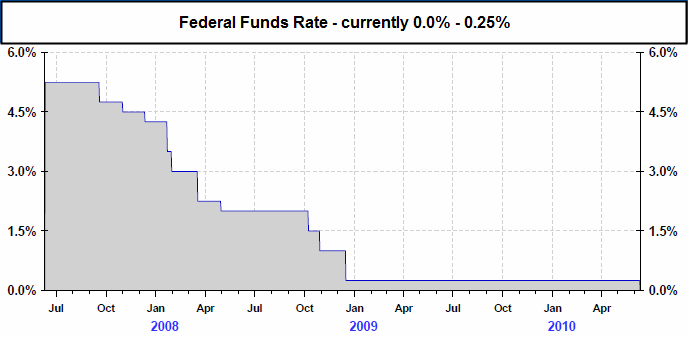|
|
|
|
|
| |||||||||||||
| ||||||||||||||
| For the week of Jun 21, 2010 --- Vol. 8, Issue 25 |
| In This Issue |
|
|
| Last Week in Review: Don't be fooled by today's low rates... Forecast for the Week: More housing news - plus, why the Fed's upcoming meeting is so important. Weekly View: Kids and credit cards - what do you need to know? |
| Last Week in Review |
|
|
| "NOBODY CAN GO BACK AND START A NEW BEGINNING...BUT ANYONE CAN START TODAY AND MAKE A NEW ENDING." Those words by the poet Maria Robinson should hold a special meaning - and warning - for anyone thinking about buying a home or refinancing, especially in light of the article by Former Fed Chairman Alan Greenspan which hit the wires last week. In his Wall Street Journal op-ed piece, Mr. Greenspan stated: "Don't be fooled by today's low rates. The government could very quickly discover the limits of its borrowing capacity." He also added that the present low inflation and low long-term rate environment has fostered a "sense of complacency (within the government) that can have dire consequences." What Mr. Greenspan is saying is that the government, rather than cutting budget deficits and showing fiscal restraint is taking advantage of this low rate and low inflation environment to accumulate more debt - and the consequences can be very bad...just look at Greece. Mr. Greenspan also said Treasury yields could spike, and in a hurry... Greenspan said, "Long-term rate increases can emerge with unexpected suddenness. Between early October 1979 and late February 1980, for example, the yield on the 10-year note rose almost four percentage points." Mr. Greenspan's sobering comments should not be taken lightly. The fact is, there are no fundamental reasons why rates - including home loan rates - should be as low as they presently are. The confluence of factors all coming together at the same time have made for an incredible low rate opportunity, but it won't last long and can change very quickly. And, like Maria Robinson's words of wisdom, once rates begin to change, there's no way to go back to take advantage of them. The time for that is today! Contact me today to discuss your unique situation. -----------------------
In one of the bright spots of news last week, the Senate approved an extension of the Homebuyer Tax Credit's closing deadline...but it's not law just yet. The original deadline to take advantage of the Tax Credit called for buyers to be under contract by April 30th and to close by June 30th. If voted into law, the extension would give those buyers until September 30th to close. However, this Tax Credit provision is part of a jobs and tax package that both chambers must still vote on before it becomes law. And remember, the extension would only apply to buyers who were under contract by April 30th. Even if you don't qualify for the Tax Credit, there are still some great opportunities available today, since rates are still at unbelievable lows right now. But heed Greenspan's words...these opportunities may not last long, so contact me today to see how you can benefit from them before it's too late. SPEAKING OF GREENSPAN'S COMMENT ABOUT THE GOVERNMENT ACCUMULATING DEBT, THEY AREN'T THE ONLY ONE IN THAT POSITION. ACCORDING TO A RECENT STUDY, THE AVERAGE BALANCE OF COLLEGE STUDENT CREDIT CARDS CLIMBED TO $3,173. FOR INFORMATION ABOUT KIDS AND CREDIT CARDS, CHECK OUT THE SPECIAL MORTGAGE MARKET GUIDE VIDEO VIEW BELOW. |
| Forecast for the Week |
|
|
| On Wednesday the Fed will release their rate decision and Policy Statement at the conclusion of their Federal Open Market Committee meeting. There is speculation that the Fed may lower their 2010 and 2011 growth targets for GDP...and lowering the target may give the Fed enough ammunition amongst its members to maintain their "extended period" language, although the concerns amongst Fed members about this language staying in place has been on the rise. In any case, it is all making for a very interesting and important Fed Meeting next week, as it could have an important bearing on the direction of rates. We'll also see news on the production and consumption of goods and services this week, beginning with Durable Goods Orders on Thursday and followed by the Gross Domestic Product on Friday. In employment news, we'll get another weekly read on Initial Jobless Claims on Thursday. Last week, Initial Jobless Claims rose by 12,000 in the latest week to 472,000 and above the 450,000 that was expected, signaling that the job market remains weak. Finally, we'll see how consumers feel about the economy in the Consumer Sentiment Index on Friday. In addition to those reports, the Treasury Department will auction $108 Billion in 2-, 5- and 7-Year Treasury Notes. This seemingly endless supply of Treasury auctions is one reason why Mr. Greenspan expressed concern about a spike higher in yields. Remember: Weak economic news normally causes money to flow out of Stocks and into Bonds, helping Bonds and home loan rates improve, while strong economic news normally has the opposite result. As you can see in the chart below, Bonds and home loan rates ended the week slightly better than when they began... but Bond prices have stalled out near historic high levels, with home loan rates near historic low levels. Again - do not wait to get in touch with me to see if the current rate climate might benefit you or someone you know. -----------------------
|
| The Mortgage Market View |
|
|
| Kids and Credit Cards
Economic Calendar for the Week of June 21 - June 25
|









